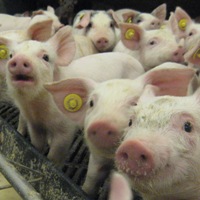Enviropigs – good for environment

Scientists at the University of Guelph have genetically engineered a group of 21 hogs living at the university so their manure will be less polluting as a conventional pig’s.
The intention is that the Enviropigs’ pork will be marketed as good for the environment.
No one has eaten it yet, but the scientists say the pork should taste like any other pig. They “look like regular pigs, they act like other pigs, and they regrettably smell like other pigs,” said Cecil Forsberg, one of the Guelph scientists.
FDA guidelines
The US Food and Drug Administration is considering an application from the university to allow the pork to go to market. The FDA recently proposed guidelines for regulating genetically engineered animals such as the Enviropigs, but consumer activists say the rules are inadequate: The guidelines won’t require developers to disclose key details, such as what genes have been used to give the animals their distinctive traits, and food from the animals won’t have to be labelled.
Even if the FDA approves the Enviropigs or other biotech animals, it’s unclear whether farmers and processors will consider commercialising them. The consumer-demand for high-tech foods is not yet evident.
“We more often hear the cries for something that is closer back to nature,” said Scott Eilert, vice president for research and development at Cargill Meat Solutions Corp., one of the largest U.S. meatpackers. Eilert didn’t rule out marketing biotech meat, but he said it is “hard for me to imagine today.”
Public benefit
The Canadian scientists think their Enviropigs would provide a public benefit. The pigs produce an enzyme in their saliva that can digest the phosphorus in their feed.
That’s good for the environment because it means less phosphorus winds up in the manure and potentially fouls rivers and streams. The pigs also could cost slightly less to feed because they don’t need a phosphorus supplement.
Source: Gannett News Service
Related Website
• University of Guelph
• FDA
• Cargill
Click here for the free Pig Progress newsletter
No one has eaten it yet, but the scientists say the pork should taste like any other pig. They “look like regular pigs, they act like other pigs, and they regrettably smell like other pigs,” said Cecil Forsberg, one of the Guelph scientists.
FDA guidelines
The US Food and Drug Administration is considering an application from the university to allow the pork to go to market. The FDA recently proposed guidelines for regulating genetically engineered animals such as the Enviropigs, but consumer activists say the rules are inadequate: The guidelines won’t require developers to disclose key details, such as what genes have been used to give the animals their distinctive traits, and food from the animals won’t have to be labelled.
Even if the FDA approves the Enviropigs or other biotech animals, it’s unclear whether farmers and processors will consider commercialising them. The consumer-demand for high-tech foods is not yet evident.
“We more often hear the cries for something that is closer back to nature,” said Scott Eilert, vice president for research and development at Cargill Meat Solutions Corp., one of the largest U.S. meatpackers. Eilert didn’t rule out marketing biotech meat, but he said it is “hard for me to imagine today.”
Public benefit
The Canadian scientists think their Enviropigs would provide a public benefit. The pigs produce an enzyme in their saliva that can digest the phosphorus in their feed.
That’s good for the environment because it means less phosphorus winds up in the manure and potentially fouls rivers and streams. The pigs also could cost slightly less to feed because they don’t need a phosphorus supplement.
Source: Gannett News Service
Related Website
• University of Guelph
• FDA
• Cargill
Click here for the free Pig Progress newsletter











